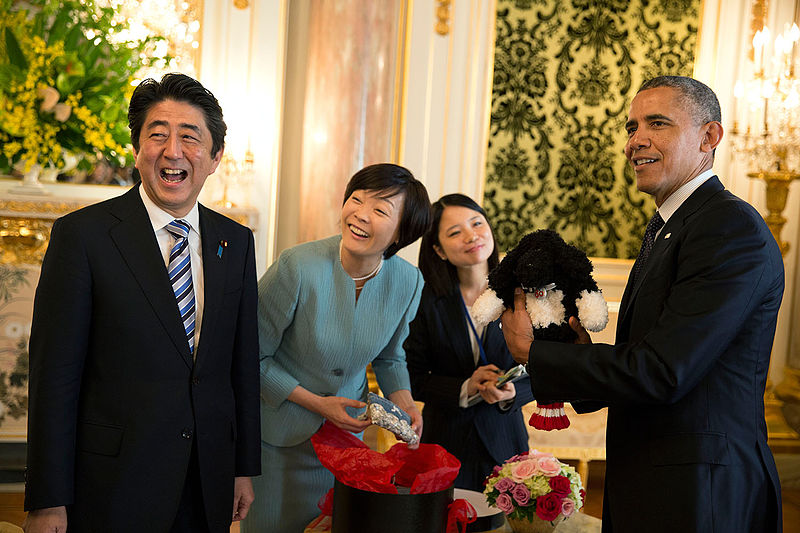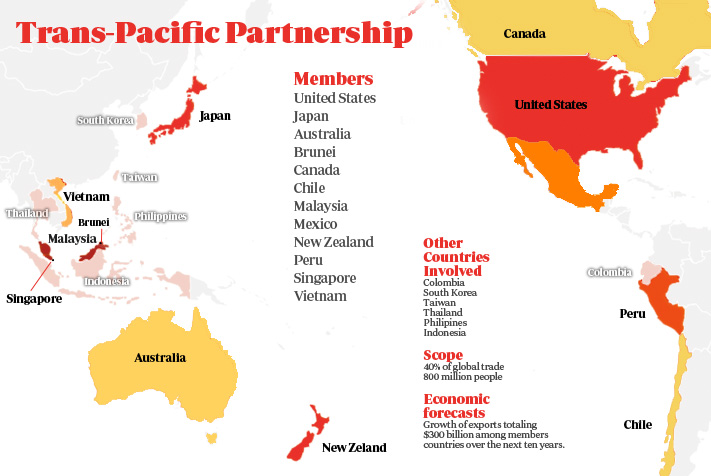The agreement signed by the United States and Japan, the Trans-Pacific Partnership (TPP), which includes ten other countries, will represent 40% of the world’s trade volume. Given its scope, this agreement is a definite win for President Obama and Prime Minister Abe.
With this agreement, numerous measures will be adopted to foster trade between the member states: lower tariffs, easing of services and investment, more balanced legislation in areas such as intellectual property, between environmental protection, labor standards, etc.

As such, the TPP represents a victory over China in terms of geopolitics and geostrategy . The Asian powerhouse was looking to establish the ground rules of the global economic game with the recent creation of the Asian Infrastructure Investment Bank (AIIB), the bank of the BRICS (Brazil, Russia, India, China and South Africa), and the new silk roads.
Who sets the ground rules?
Although there is still a long way to go (the agreement must be signed and ratified by the respective parliaments), the TPP is aimed at containing the rise of China and its global influence, particularly in the Pacific region .
Fifteen months from the end of his second term, Barack Obama’s legacy is growing with the TPP now being added to the historic agreements reached with Cuba and Iran.
“When more than 95% of our potential customers live outside our borders, we can’t let countries like China write the rules of the global economy,” said Obama in unequivocal terms. “We should write those rules.”
Meanwhile, the Japanese Prime Minister stressed that the TPP “is the third arrow of Abenomics,” the name given to a set of economic measures promoted by Shinzō Abe to revitalize the stagnant Japanese economy. Abe, he explained, is hoping the TPP will increase the competitiveness of Japan’s economy following monetary and fiscal stimulus packages, and the structural reforms already implemented.
TPP: impetus for future agreement with the EU?
At the same time, this agreement could accelerate negotiations between the United States and the European Union to reach a new trade agreement, the Transatlantic Trade and Investment Partnership (TTIP), which is even more important, as it represents 60% of global trade.
If both negotiations prove successful, the United States will be sitting in a privileged position that would allow it to slow down China’s rise and lay the foundations for competing with the country on a global level.
Criticisms
Announcement of the agreement and of its terms aroused suspicion almost immediately, especially in the United States. First, there has been criticism about the secrecy with which the process was carried out. And that it particularly benefits large multinationals and the world of high finance.
Also, some feel it poses a threat to quality standards, which affects the environment and, above all, the US labor market. In fact, American trade unions are more concerned about the TPP than NAFTA (the trade agreement between the US, Canada and Mexico), championed in 1993 by President Clinton.
Now, with the TPP, politicians (mostly Democrats) and trade unions fear that the door will open to new offshoring, leading to lost employment in the US, wage reduction, or other consequences.




One thought on “TPP: United States and Japan make a move”
Comments are closed.